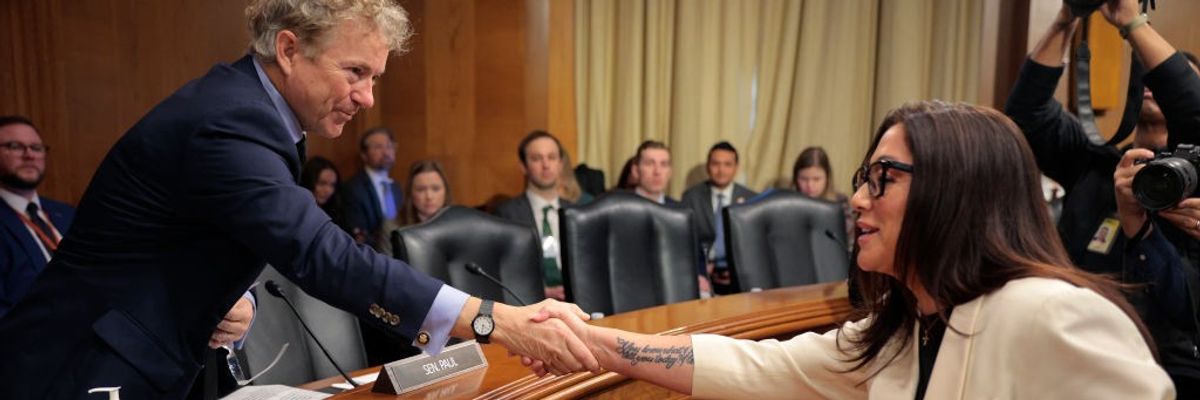U.S. President Donald Trump's pick to lead the Department of Labor made clear during her Senate confirmation hearing on Wednesday that she no longer supports legislation known as the PRO Act, which would bolster worker organizing and dramatically weaken anti-union "right-to-work" laws currently in place in over two dozen states.
Asked by Sen. Rand Paul (R-Ky.) whether she still supports the Protecting the Right to Organize Act—a bill she co-sponsored while in Congress—former Rep. Lori Chavez-DeRemer (R-Ore.) said she signed onto the bill because she "wanted to be at that table," not because she was fully supportive of its provisions.
Chavez-DeRemer answered "yes" when Paul—the lead sponsor of the National Right to Work Act—specifically asked her to confirm that she no longer supports "the aspect of the PRO Act that would have overturned state right-to-work laws."
"The right to work is a fundamental tenet of labor laws, where states have a right to choose if they want to be a right-to-work states," said Chavez-DeRemer.
"How very not pro-worker of you, Lori," the Philadelphia Council AFL-CIO wrote in response.
Watch the exchange:
In so-called right-to-work (RTW) states, employees in unionized workplaces can opt out of paying union dues while still benefiting from the union's collective bargaining efforts.
An Economic Policy Institute study published last year found that RTW states "have lower unionization rates, wages, and benefits compared with non-RTW states."
"RTW laws are designed to diminish workers' collective power by prohibiting unions and employers from negotiating union security agreements into collective bargaining agreements, making it harder for workers to form, join, and sustain unions," the study noted. "Consequently, workers in states with RTW laws have lower wages, reduced access to health and retirement benefits, and higher workplace fatality rates. On average, workers in RTW states are paid 3.2% less than workers with similar characteristics in non-RTW states, which translates to $1,670 less per year for a full-time worker."
In her opening remarks to the Senate Health, Education, Labor, and Pensions Committee on Wednesday, Chavez-DeRemer said her job if confirmed "will be to implement President Trump's policy vision"—which has thus far been glaringly anti-worker.
"In his first few weeks back in office, Trump fired the [National Labor Relations Board's] acting chairperson, leaving the board without a quorum to enforce laws that protect workers' right to unionize," Steven Greenhouse, a senior fellow at The Century Foundation, wrote Tuesday. "Trump has designated [Elon] Musk, a vehemently anti-union billionaire, to launch an all-out war against the federal bureaucracy and workforce, and Trump and Musk have essentially treated the nation's 2 million-plus federal employees as if they were disposable, low-quality widgets."
Trump also removed former NLRB General Counsel Jennifer Abruzzo, who was strongly pro-labor. The president's acting replacement has moved quickly to roll back NLRB guidance issued during Abruzzo's tenure, including a memo declaring that anti-union "captive audience meetings" amount to an "unlawful threat" aimed at deterring union organizing.
During Wednesday's hearing, Sen. Bernie Sanders (I-Vt.) raised Trump's termination of former NLRB member Gwynne Wilcox, who argues her dismissal was illegal and is suing Trump in federal court.
Sanders said he also views Wilcox's firing as unlawful and asked Chavez-DeRemer if she agrees.
In response, Chavez-DeRemer said that Trump "has a right to exercise his executive power."
